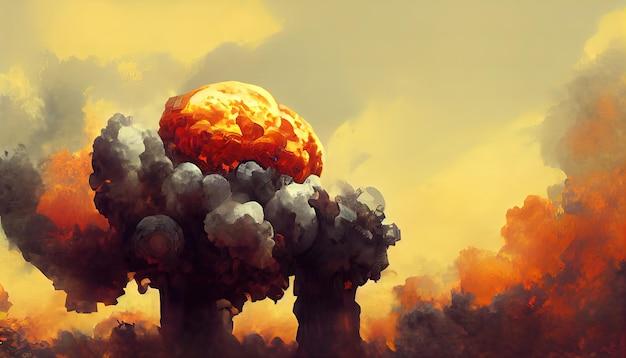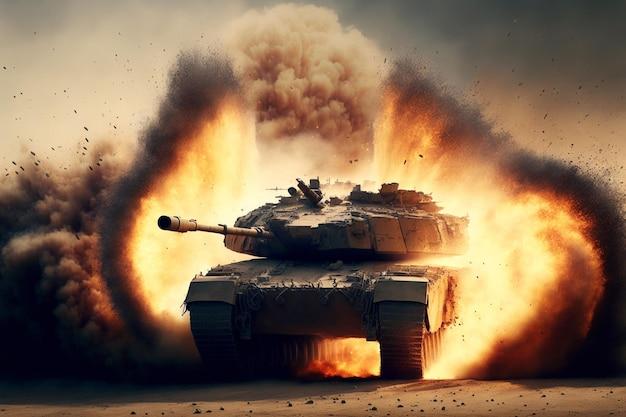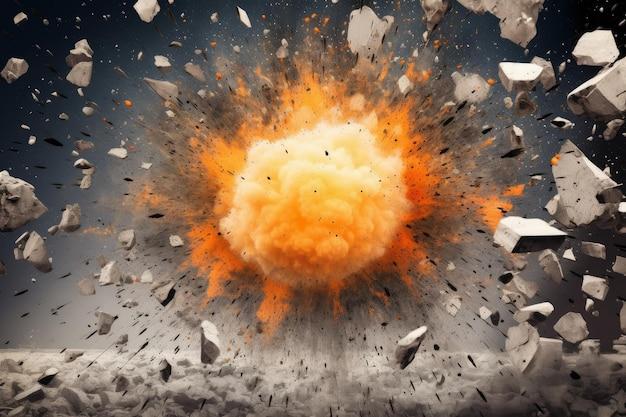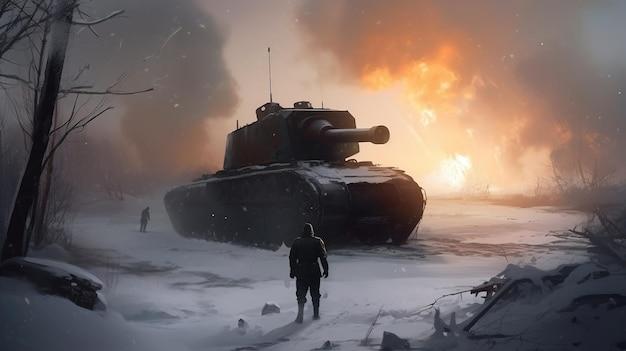Gasoline is an essential fuel used to power vehicles and machinery. While it’s an integral part of modern life, gasoline also has the potential to cause harm. One of the most significant risks associated with gasoline is its potential to explode. Gas tank explosions can cause severe injuries, property damage, and even fatalities. In this comprehensive blog post, we’ll explore the question, “can a gas tank explode?” and investigate some related topics such as heat for gas tanks, the possibility of gas tanks catching fire, and the explosive nature of gasoline. We’ll also examine the causes of gas cylinder explosions at home and what happens if your gas tank catches on fire, so keep reading to stay informed and stay safe.
Can a Gas Tank Explode
While the chances of a gas tank exploding are rare, it could happen. Gasoline is a volatile substance that can ignite under the right conditions. However, there are some misconceptions surrounding this topic that we need to address.
Myth: A Gas Tank Will Explode if You Leave the Cap Off
Just because you forget to put the gas cap back on doesn’t mean the tank will explode. Gasoline doesn’t just spontaneously combust – it needs an ignition source, like a spark or flame. While leaving the gas cap off can lead to evaporation and potential loss of fuel, it won’t cause an explosion.
Myth: A Bullet Can Make a Gas Tank Explode
While it may seem like a scene from an action movie, shooting a gas tank won’t necessarily cause an explosion. In fact, experts say that shooting a gas tank with a bullet is likely to only result in a small hole and a fuel leak. Unless there is an ignition source nearby, such as a spark or flame, there won’t be an explosion.
Fact: Overfilling Your Tank Can Lead to a Fire
One thing that can cause a fire is overfilling your gas tank. Gas tanks need space for the gasoline to expand as it warms up, so don’t try to cram in that last bit of gas. Overfilled tanks can cause gasoline to spill over and potentially ignite if there is an ignition source nearby.
Fact: Car Accidents Can Cause a Gas Tank Explosion
While rare, car accidents can cause a gas tank to rupture and potentially lead to an explosion. If there is an ignition source nearby, gasoline can ignite and cause a fire or explosion. It’s important to always drive safely and avoid accidents whenever possible.
In conclusion, while the possibility of a gas tank exploding is rare, it’s essential to understand the facts and myths surrounding this topic. With proper safety measures, such as not overfilling your tank and driving safely, you can reduce the risk of a potential explosion. Remember, gasoline is a highly flammable substance, so always handle it with care.
Using Heet for Gas Tank: An Experimental Chaos
Dealing with gas tanks is no easy feat. There are several things you should keep in mind because when it comes to combustible material, even a small mistake can lead to a blast and ruin your day, and worse. Gasoline can spill anytime, and that’s where Heet comes in! But how does Heet for gas tank work, though?
What is Heet
Heet is a fuel additive that helps to remove water from your fuel system. It prevents the buildup of water in the gas tank. In short, Heet for gas tank is your best bet for better fuel efficiency and performance of the engine.
Functionality
When your gasoline has water in it, you’re in for a terrible experience. Water can cause the gas to freeze, making the vehicle inactive or make your engine sluggish, making it challenging to start during cold weather. Using just a small quantity of this fuel treatment will rapidly absorb the water from the fuel tank and reduce the droplets to a level, where it can be drained off. Notwithstanding, it’s not an entitlement or safety feature that prevents the gas tanks from exploding.
Is it Safe to Use Heet for Gas Tank
Heet is a reputable brand that has been around for several years, so it’s safe for use. It’s safe to use, but does it guarantee that your gas tank wouldn’t explode? Heet is not an explosive. Keep in mind that using it does not guarantee that your gas tank will never explode, and it doesn’t prevent explosions from other causes like a gas leak, hot car, etc.
The Risk of Not Using Heet
It’s best to use Heet for gas tanks to prevent water build-up in the tanks. A significant downside of not using it is that it can cause the engine to malfunction and make the vehicle difficult to start during cold temperatures. At worst, it can damage your injectors and fuel pump, potentially causing the vehicle to stall in traffic, increase fuel consumption, and ultimately lead to costly repairs.
Even though Heet serves a unique purpose in your gas tank, it doesn’t guarantee that your gas tank won’t explode. Always keep good practices, use caution when working with gasoline, and follow the instructions provided for using additives and treatments. Above all, always remember that safety should come first.
Exploding Gasoline? Really
Believe it or not, gasoline doesn’t actually explode on its own. In fact, gasoline is a fairly stable substance. But don’t misunderstand, gasoline can be dangerous.
The Perfect Mixture
To explode, gasoline must mix with oxygen or another oxidizer at the perfect ratio. This perfect mixture is achieved when there is between about 1.4% and 7.6% gasoline fumes mixed with air.
A Spark is All it Takes
All that’s left is a source of ignition, and the mixture will ignite, causing an explosion. A spark from a plug, a lit cigarette, or even lit static discharge from your clothes can provide the ignition needed to set off an explosion.
Don’t Worry (Too Much)
So while gasoline may not explode on its own, it is still important to handle it safely. Always use proper storage containers, and never leave gasoline in direct sunlight or a hot car. And of course, avoid smoking or any other source of ignition around gas fumes. Stay safe out there!
Can gas tanks catch fire
Gas tanks are like ticking time bombs, waiting to explode at the slightest provocation. Gasoline is highly flammable, and even the slightest spark can ignite it, causing a massive explosion that can wreak havoc on the surrounding area. So, can gas tanks catch fire? In short, yes they can. But let’s dive deeper into the details.
Gasoline and Fire
Gasoline is a highly volatile substance that easily vaporizes into the air. These vapors can quickly ignite when exposed to heat or a spark, leading to a fire or explosion. Gasoline fires can spread rapidly, leading to catastrophic damage and loss of life. Therefore, it’s crucial to handle gasoline carefully and store it in a safe place.
Causes of Gas Tank Fires
Gas tank fires can be caused by a variety of factors. For example, a faulty fuel pump can cause gasoline to leak, increasing the risk of a fire. Additionally, a leaking gas tank can spark when in contact with metal, leading to an explosion.
Furthermore, smoking near a gas tank is a huge no-no, as a lit cigarette can ignite the gasoline vapors in the air. And while we’re on the subject, please don’t light fireworks near a gas tank either, as this can lead to disastrous consequences.
Preventing Gas Tank Fires
The best way to prevent gas tank fires is to handle gasoline responsibly. Always store gasoline in a cool, dry place away from any sources of heat or flame. Additionally, make sure your vehicle’s gas tank and fuel system are regularly maintained and inspected to prevent leaks and other potential hazards.
Be sure to practice proper fueling techniques when filling up your gas tank. Never overfill your tank or top off your gas tank, as this can cause gasoline to overflow and increase the risk of a fire.
So, can gas tanks catch fire? Yes, they absolutely can. That’s why it’s essential to handle gasoline with care and take the necessary precautions to prevent fires and explosions. By following these safety tips, you can help ensure that your gas tank stays firmly on the ground and out of the air.
Can Propane Tanks Explode
Propane tanks are a common source of fuel for grills, heaters, and other appliances. But can they explode? The short answer is yes. The long answer is, well, longer.
A Little Background on Propane
Propane is a colorless, odorless gas that is stored under pressure in metal cylinders. It’s commonly used as fuel for grills, generators, and other appliances. When propane is released from its container and comes into contact with air, it vaporizes and can be ignited by a spark or flame.
Why Propane Tanks Can Explode
Propane tanks can explode if they are heated or damaged. When a propane tank is exposed to heat, the pressure inside the tank can increase rapidly, causing the tank to rupture or explode. Propane tanks can also explode if they are damaged in some way, such as by a puncture or impact.
Will Your Propane Tank Explode
Most propane tanks are designed to withstand a certain amount of pressure and are built with safety features to prevent explosions. However, accidents can still happen. Here are some things to keep in mind to reduce the risk of your propane tank exploding:
- Always make sure your propane tank is in good condition and free from damage.
- Never store your propane tank inside your home or garage.
- Keep your propane tank away from heat sources like grills, heaters, and fire pits.
- If you suspect that your propane tank is damaged or leaking, call a professional to inspect it and make any necessary repairs.
Propane tanks can explode, but the risk can be significantly reduced by following proper safety procedures and maintaining your tank in good condition. Don’t let the fear of explosions deter you from using propane as a fuel source, but do take the necessary precautions to ensure your safety.
How Explosive is Gasoline
Gasoline is flammable, which means it can catch fire and burn in the right conditions. However, the idea that gas tanks are ticking time bombs waiting to explode at any moment is widespread and not entirely accurate. Let’s take a closer look at how explosive gasoline really is.
Flash Point vs. Autoignition Temperature
Before we dive into gasoline’s explosive potential, let’s first understand two critical terms: flash point and autoignition temperature.
- Flash point refers to the temperature at which gasoline releases enough vapor to ignite but doesn’t continue to burn.
- Autoignition temperature is the temperature at which gasoline spontaneously ignites without an external spark.
Gasoline’s flashpoint is approximately -45 degrees Fahrenheit, which means it releases enough vapor to ignite in that temperature range. However, if the gasoline is not exposed to an ignition source at this temperature, it won’t burst into flames.
On the other hand, gasoline’s autoignition temperature is around 536 degrees Fahrenheit. This means that if gasoline reaches this temperature without an ignition source, it will spontaneously ignite.
Common Causes of Gas Tank Explosions
Now that we understand the terms flash point and autoignition temperature, we can talk about the common causes of gas tank explosions.
- The gas tank isn’t venting correctly: Gas tanks need to vent to prevent pressure from building up inside the tank. If the tank isn’t venting properly, pressure can build up and cause an explosion.
- Sparks or flames enter the tank: Gasoline won’t spontaneously explode, but if an ignition source comes into contact with gasoline vapors inside the tank, it can ignite them and cause an explosion.
- Extreme heat causes the gas tank to rupture: Gas tanks are made of metal and can rupture if they’re exposed to extreme heat or fire.
So, how explosive is gasoline? The answer is that gasoline isn’t inherently explosive, but it can be dangerous if it’s not handled correctly or exposed to the right conditions. Gasoline’s flash point makes it flammable, meaning it can ignite if exposed to heat, sparks, or flames. However, the conditions necessary for gasoline to explode are relatively rare, and gas tanks aren’t ticking time bombs waiting to detonate. Remember the crucial safety measures around gasoline to avoid explosive situations.
Do Gas Tanks Explode When Shot
Gas tanks are precisely what they sound like – tanks filled with gas or fuel; hence they are prone to explosions. But do they explode when shot? That’s an excellent question, and the answer is simple; it depends!
It All Depends on the Circumstances
If the gas tank contains fumes, even a drop of a match can cause an explosion. But, on the other hand, if the tank is empty, even a bullet won’t cause any harm. Understandably, things aren’t always black and white; hence it’s crucial to understand the circumstances surrounding the incident before jumping to any conclusions.
The Type of Bullet Matters
When it comes to gas tank explosions, not all bullets are created equal. If you shoot a regular bullet into a gas tank, it will most likely just pierce the tank and come out the other side, barely causing any harm. However, shooting armor-piercing bullets or explosive rounds, on the other hand, can result in a considerable explosion.
The Position of the Bullet Matters
When a bullet pierces the gas tank, the position of the bullet can determine the extent of the explosion. If the bullet hits the top part of the tank, there’s a higher chance of an explosion happening since the gases in the vapor chamber are likely to be ignited. However, if the bullet hits below that line, the explosion might not happen.
In conclusion, gas tanks can explode when shot, but it depends on the circumstances surrounding the incident. Factors such as the type of bullet used, the position of the bullet, and whether the tank is full of fuel and fumes affect the explosion. It’s safe to say that it’s not advisable to shoot at gas tanks randomly. If you must shoot a gas tank, make sure it’s safe to do so and take all the necessary precautions to avoid any accidents.
Can Gas Cans Explode in Hot Weather
Gas cans can be very useful in a pinch, but like anything else, they do come with risks. One of the biggest concerns people have when it comes to gas cans is whether or not they can explode in hot weather. The truth is that gas cans can indeed explode in hot weather, but fortunately, it’s not something that happens often.
How Does Hot Weather Affect Gas Cans
When the temperature rises, so does the pressure inside a gas can. This is because the gas inside the can expands as it gets hotter. If the pressure inside the can becomes too great, the can may rupture. This can lead to a gas leak or even an explosion, which is obviously something you want to avoid.
How Can You Prevent Gas Cans from Exploding in Hot Weather
There are several things you can do to minimize the risk of your gas can exploding in hot weather. First, make sure you store your gas can in a cool place, such as a basement or garage. This will help keep the temperature inside the can from rising too much. If you do need to transport your gas can in hot weather, make sure it’s secured in your vehicle where it won’t be exposed to direct sunlight or other sources of heat.
Another thing you can do to prevent your gas can from exploding is to make sure it’s in good condition. Check the can for cracks or other signs of damage before you use it, and make sure the cap is screwed on tightly. If the can has been sitting in the hot sun for a while, let it cool down before you try to use it. And of course, never smoke or use an open flame around a gas can.
What Should You Do If Your Gas Can Explodes
If your gas can does happen to explode, the most important thing is to stay calm. Move away from the area quickly, and don’t do anything that could ignite the gas fumes, such as lighting a match or turning on a light switch. Call the fire department immediately, and don’t attempt to put out the fire yourself.
In conclusion, while gas cans can indeed explode in hot weather, it’s not something you need to worry about too much as long as you take proper precautions. By storing your gas can in a cool place, checking it for damage, and using it safely, you can minimize the risk of an explosion and stay safe while enjoying the convenience of your gas can.
Causes of Gas Cylinder Explosion at Home
Gas cylinder explosions at home can cause catastrophic damage to property and even loss of life. Knowing the causes of gas cylinder explosions at home can help you avoid them. Here are some of the leading causes of gas cylinder explosions:
Poor Maintenance
Gas cylinders require regular maintenance to ensure they are in good condition, and any potential dangers are mitigated. Failure to conduct regular maintenance can lead to the buildup of rust and corrosion, which can weaken the cylinder’s walls, making the cylinder more susceptible to explosions.
Overfilling
Overfilling gas cylinders can put pressure on the cylinder’s walls, leading to cracks and ultimately explosions. It’s important to ensure that your gas cylinder is filled with the appropriate amount of gas to avoid overfilling.
Mishandling
Mishandling of gas cylinders can lead to explosions. This includes dropping the cylinder, rolling it, or exposing it to high temperatures or open flames. It’s important to handle gas cylinders with care to avoid any accidents.
Defective Equipment
Defective equipment, such as regulators and valves, can cause gas leaks, leading to gas cylinder explosions. It’s important to ensure that the equipment you use with your gas cylinder is in good condition and functioning correctly.
Exposure to Fire
Exposure to fire can cause gas cylinder explosions. It’s essential to keep your gas cylinder away from any open flames or heat sources. In case of a fire outbreak, it’s crucial to evacuate the area and call emergency services.
In conclusion, gas cylinder explosions can be avoided by observing the proper guidelines and safety measures such as conducting regular maintenance, avoiding overfilling gas cylinders, handling them with care, using defect-free equipment, and keeping them away from open flames and heat sources.
What happens if a gas tank catches on fire
As much as we love our vehicles, we can’t deny the fact that they can be a bit of a fire hazard. A gas tank catching on fire is one of those scenarios that we hope never happens, but it’s always best to know what we’re up against just in case. Let’s dive into what happens when a gas tank catches on fire.
Fire, fire, fire!
When a gas tank catches fire, it goes up in flames. The gasoline inside the tank is highly flammable and can ignite with the slightest spark – think friction, static electricity, even a hot tailpipe. Once the gasoline catches fire, you can expect a pretty impressive blaze.
Boom, goes the dynamite!
A gas tank fire can result in an explosion, especially if there’s a large quantity of gasoline in the tank. When the gasoline heats up, it expands, and if it can’t go anywhere, it will build up pressure. Eventually, the pressure reaches a critical point, and the tank explodes.
Smoke gets in your eyes (and lungs)
A gas tank fire releases a lot of smoke, which can be just as dangerous as the flames themselves. The smoke is toxic and contains lots of hazardous chemicals. If you’re unfortunate enough to be caught in a gas tank fire, try to stay low to avoid inhaling too much smoke.
The aftermath
Assuming you survive a gas tank fire, the aftermath can be pretty grim. If the explosion didn’t finish the job, you’d be left with some severe burns and painful injuries. Even worse, you could be left with permanent scarring or disfigurement.
In conclusion, a gas tank catching on fire is not something you want to experience. If you smell gasoline or notice any signs of a fuel leak, take immediate action to prevent a disaster. And if you’re ever caught in a gas tank fire, remember to stay as low as possible and get out of there as soon as you can.



